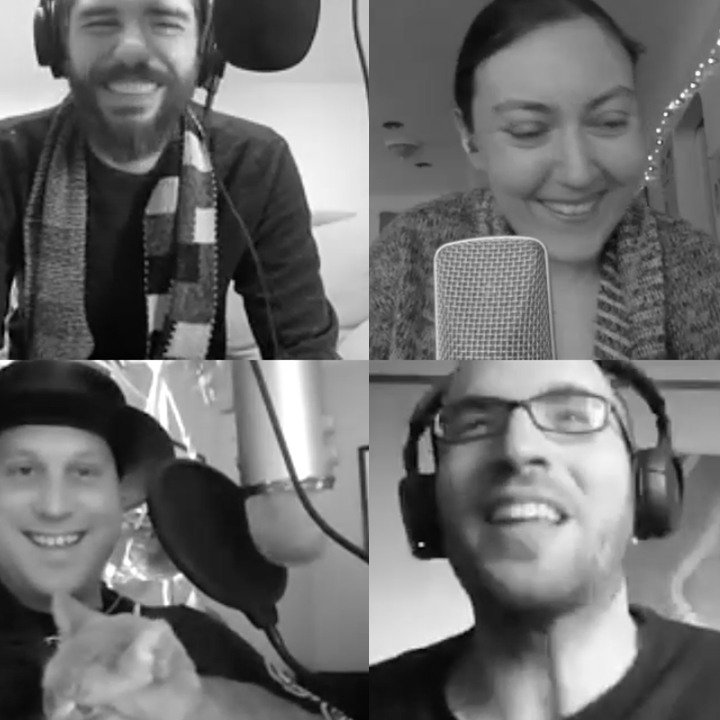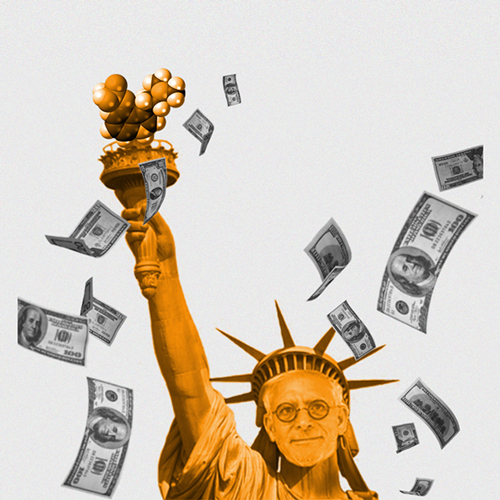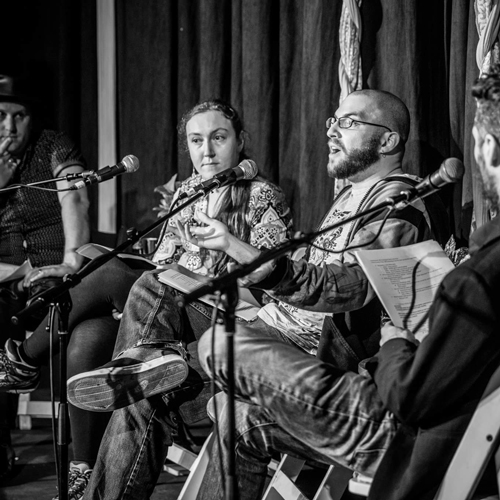Plus Three
Plus Three dives deep into the world of drugs, from local decriminalization and emerging psychedelic corporations to leftist politics and mass incarceration. Each week the team and guests attempt to make sense of the complex connections between drugs, science, capitalism, policy, and culture. The podcast is co-hosted by Psymposia co-founder Brian Normand, psychedelics research and bio-ethicist Nese Devenot, evolutionary ecologist Brian Pace, and underground researcher David Nickles.
Psymposia advisory board member and psychedelic researcher, Jae Sevelius, joins us to talk about queer theory, psychedelic research with transgender and gender diverse people, and what happens when political assumptions go unexamined in both research contexts and the world at large. Drawing on the work of Dr. Sevelius, as well as Dr. Devenot and Dr. Ross, we discuss some of the ways that research and social relations reproduce the logic of mainstream culture, and how queering acts as barrier to and disruption of that reproduction.
Co-hosts: Lily Kay Ross, Neşe Devenot, David Nickles, Brian Normand, Brian Pace, Russell Hausfeld. Editor: Matt Payne
Support us on Patreon or make a tax-deductible donation.
**Thank you to our Patreon podcast and video supporters: Reliable Spores, Houston Puck, Dave Hodges, Jon Hanna, James Hubbard, Lindsay Munson, Evan Freimuth, Abigail Bianchi, Meghan Kennedy, Dave Ayers, Darrell Duane, Tehseen Noorani, Tariqul Islam, Clifford Hudson, Daniel McQueen, Maryann Kehoe, Ben Yono, Nathan Espinosa, Annick McIntosh, Starbuck, Aaron Williams, Jenine Innes, Julia A, Jesse Liberty, Christian Dawley, Leon Boroditsky, Samy Tammam, Amanda Alexander, Jason Gross, Paige Hausfeld, John Bannon, Clifford Hudson
Psymposia editors discuss Dr. Martin Ball’s “session info” document that the retired 5-MeO-DMT practitioner sent to Psymposia. Dr. Ball has referenced the document in defense of his practices and cites it as evidence that his clients consented to him touching their genitals or vomiting on them while under the influence of 5-MeO-DMT.
Our analysis shows that this isn’t actually a consent document. It sets the stage for what is considered normal, and positions Dr. Ball as the ultimate authority on the subject. It creates expectations which render people more vulnerable while filtering out those who are less susceptible to manipulation tactics and who notice the red flags early on.
Co-hosts: Lily Kay Ross, Neşe Devenot, David Nickles, Russell Hausfeld. Editor: Matt Payne
Support us on Patreon or make a tax-deductible donation.
For more:
Full "Session Info" document: https://www.psymposia.com/wp-content/uploads/2021/03/MB-Session-Info-Sheet.pdf
Psymposia video: https://www.youtube.com/watch?v=qabODDTigNQ
Psymposia article: https://www.psymposia.com/magazine/haden-ball-maps-canada-resignation-5meo-dmt-practitioner-abuse/
Martin Ball's 2016 presentation at Los Angeles Medicinal Plant Society (LAMPS) https://youtu.be/PQctOMSmBuk
Octavio Rettig malpractice https://youtu.be/aGJRcb5tRPU
**Thank you to our Patreon podcast and video supporters: Reliable Spores, Houston Puck, Dave Hodges, Jon Hanna, James Hubbard, Lindsay Munson, Evan Freimuth, Abigail Bianchi, Meghan Kennedy, Dave Ayers, Darrell Duane, Tehseen Noorani, Tariqul Islam, Clifford Hudson, Daniel McQueen, Maryann Kehoe, Ben Yono, Nathan Espinosa, Annick McIntosh, Starbuck, Aaron Williams, Jenine Innes, Julia A, Jesse Liberty, Christian Dawley, Leon Boroditsky, Samy Tammam, Amanda Alexander, Jason Gross, Paige Hausfeld, John Bannon, Clifford Hudson
Psymposia Advisory Board member Alex Zaitchik drops in to chat about his work and experiences as an investigative journalist with a critical analysis of capitalism. Alex has covered topics ranging from the effects of extractive industry on Indigenous communities, to the existential need for degrowth, and the economics of vaccine development.
Co-hosts: David Nickles, Brian Normand, Brian Pace. Editor: Matt Payne
Support us on Patreon or make a tax-deductible donation.
Thank you to our podcast and video patrons:
Reliable Spores, Houston Puck, Dave Hodges, James Hubbard, Lindsay Munson, Evan Freimuth, Abigail Bianchi, Meghan Kennedy, Dave Ayers, Darrell Duane, Tehseen Noorani, Tariqul Islam, Clifford Hudson, Daniel McQueen, Maryann Kehoe, Ben ohno, Nathan Espinosa, Srikanth Cherla, Bill Harvest, Annick McIntosh, Starbuck, Anne Sagewood, Aaron Williams, Jenine Innes, Julia A, Jesse Liberty, Christian Dawley, Leon Boroditsky, Samy Tammam, Amanda Alexander, Jason Gross, Paige Hausfeld, John Bannon
In this episode, we're joined by our new advisory board member Yarelix Estrada to discuss her experiences with organizing psychedelic societies, psychedelic exceptionalism, and harm reduction on the streets of New York. Yarelix shares insights from her formal and practical training in public health as well as her interactions with frontline communities and her personal experiences.
Co-hosts: Neşe Devenot, David Nickles, Brian Pace. Editor: Matt Payne
Support us on Patreon or make a tax-deductible donation.
Thank you to our podcast and video patrons:
Reliable Spores, Houston Puck, Dave Hodges, James Hubbard, Lindsay Munson, Evan Freimuth, Abigail Bianchi, Meghan Kennedy, Dave Ayers, Darrell Duane, Tehseen Noorani, Tariqul Islam, Clifford Hudson, Daniel McQueen, Maryann Kehoe, Ben ohno, Nathan Espinosa, Srikanth Cherla, Bill Harvest, Annick McIntosh, Starbuck, Anne Sagewood, Aaron Williams, Jenine Innes, Julia A, Jesse Liberty, Christian Dawley, Leon Boroditsky, Samy Tammam, Amanda Alexander, Jason Gross, Paige Hausfeld, John Bannon
Brian Normand and David Nickles are joined by Psymposia Senior Writer Russell Hausfeld to discuss MindMed's CEO, Jamon Rahn's, recent claims that his company "may be creating effectively the Tesla of mental health,” and that the company is now a "$1B+ Unicorn.”
Tesla, for those unaware, has been sued by (and settled with) the SEC for securities fraud, flaunted COVID-19 (and other) safety guidelines, and has experienced so many lawsuits and controversies even its wikipedia page acknowledges, "This is a partial list of the surrounding lawsuits and controversies...Tesla is party to over 800 lawsuits.” And oh yeah, Tesla’s stock is an absurd bubble.
It's a bold comparison for Rahn to make, but we believe him when he tells us what he's aiming for.
Support us on Patreon or make a tax-deductible donation.
Previous stories:
MindMed’s CEO Jamon “JR” Rahn Wants Nothing To Do With Those Psychedelic Decrim People
Bicycle Day 2020 Was Truly Historic, But Not for the Reasons You Think
Thank you to our podcast and video patrons:
Reliable Spores, Houston Puck, Dave Hodges, James Hubbard, Lindsay Munson, Evan Freimuth, Abigail Bianchi, Meghan Kennedy, Dave Ayers, Darrell Duane, Tehseen Noorani, Tariqul Islam, Clifford Hudson, Daniel McQueen, Maryann Kehoe, Ben ohno, Nathan Espinosa, Srikanth Cherla, Bill Harvest, Annick McIntosh, Starbuck, Anne Sagewood, Aaron Williams, Jenine Innes, Julia A, Jesse Liberty, Christian Dawley, Leon Boroditsky, Samy Tammam, Amanda Alexander, Jason Gross, Paige Hausfeld, John Bannon
In this episode, we discuss a prominent participant in the bumbling coup attempt of January 6: "QAnon Shaman" Jake Angeli. Along with a coalition of Donald Trump supporters and assorted right wing ideologues, Angeli stormed the Capitol following a speech by Trump. Featuring a dissection of an "Ascension Masterclass" that was hosted on Angeli's now-deleted Star Seed Academy Facebook page, we (once again) wade into the disturbing world of psychedelic authoritarianism.
Support us on Patreon or make a tax-deductible donation.
Co-hosts: Brian Normand, Neşe Devenot, David Nickles, Brian Pace. Editor: Matt Payne
*Patrons*
Reliable Spores, Houston Puck, Dave Hodges, James Hubbard, Lindsay Munson, Evan Freimuth, Abigail Bianchi, Meghan Kennedy, Dave Ayers, Darrell Duane, Tehseen Noorani, Tariqul Islam, Clifford Hudson, Daniel McQueen, Maryann Kehoe, Ben ohno, Nathan Espinosa, Srikanth Cherla, Bill Harvest, Annick McIntosh, Starbuck, Anne Sagewood, Aaron Williams, Jenine Innes, Julia A, Jesse Liberty, Christian Dawley, Leon Boroditsky, Samy Tammam, Amanda Alexander, Jason Gross, Paige Hausfeld, John Bannon
This episode explores the rise of self-styled “thought leaders” within the psychedelic community, using Anand Giridharadas’ book “Winners Take All” as a jumping off point. Although people have been on the conference circuit for years, the recent explosion of capital investments means that there’s an unprecedented potential for money, celebrity, and status in the space.
The thought leader proposes quick fixes that are palatable to the people who are in positions of power, who then seek to privatize those “solutions” while enriching themselves along the way. While they talk about leading the way to meaningful change, they’re really just focusing on the symptoms—and getting paid while they’re doing that.
Corporate consulting firms like McKinsey & Co typify this dynamic as they propose “solutions” that do little more than enrich themselves and their corporate paymasters.
While psychedelic “thought leaders” offer up their ideas as solutions to the world’s problems, we take a look at how the “thought leader” cozies up to power under capitalism in a way that perpetuates the status quo.
Support the show on Patreon. Co-hosts: Brian Normand, Neşe Devenot, David Nickles, Brian Pace, Russell Hausfeld. Editor: Matt Payne
Support us on Patreon or make a tax-deductible donation.
*Patrons*
Reliable Spores, Houston Puck, Dave Hodges, James Hubbard, Lindsay Munson, Evan Freimuth, Abigail Bianchi, Meghan Kennedy, Dave Ayers, Darrell Duane, Tehseen Noorani, Tariqul Islam, Clifford Hudson, Daniel McQueen, Maryann Kehoe, Yono ohno, Nathan Espinosa, Srikanth Cherla, Bill Harvest, Annick McIntosh, Starbuck, Anne Sagewood, Aaron Williams, Jenine Innes, Julia A, Jesse Liberty, Christian Dawley, Leon Boroditsky, Samy Tammam, Amanda Alexander
We kicked off the start of our ongoing livestreams with the announcement of Psymposia's 501(c)(3) non-profit status, discussions of corporadelic dynamics, fond memories of helping people learn how to extract psychedelic drugs during an Ivy League University's psychedelic conference, and a whole bunch of back and forth with the audience about the current state (and future) of psychedelia.
Catch our next livestream on December 17 at 8pm ET and feel free to send questions our way in advance, on Twitter @psymposia or via email: hi at psymposia dot com.
Support the show on Patreon. Co-hosts: Brian Normand, Neşe Devenot, David Nickles, Brian Pace, Russell Hausfeld. Editor: Matt Payne
In this episode we explore the myriad of problems that result from media outlets treating corporate press releases as though they're legitimate news sources, rather than advertisements. We examine "science by press release" cases ranging from psychedelic pharmaceutical firms who claim their barely-studied compounds are superior to (and safer than) psilocybin (one of the safest psychoactive compounds in the human pharmacopoeia), to students who claimed Oreos were as addictive as cocaine, to pineal DMT, cold fusion, and more.
Support the show on Patreon. Co-hosts: Brian Normand, Neşe Devenot, Brian Pace, David Nickles, Russell Hausfeld.
Links
Psychedelic Media Should Stop Parroting Corporate Press Releases
Mindset Pharma Reports Positive Results of Synthetic Psilocybin-Inspired Compounds
No, Oreos Aren't as Addictive as Cocaine
Pineal Gland DMT – What the Science Says
Hyped-up science erodes trust. Here’s how researchers can fight back.
Recorded live at the Capital Psychedelic Summit, hosted virtually in Washington D.C., Russell Hausfeld joins Brian Normand and David Nickles to discuss the infiltration of the psychedelic pharmaceutical industry by companies, investors, and executives from extractive industry.
This episode explores the destructive nature of extractive industry and the effects of introducing those dynamics into psychedelia. If the same people destroying Indigenous lands told you they believed in "sacred reciprocity," would you believe them?
Support the show on Patreon. Co-hosts: Brian Normand, David Nickles, Russell Hausfeld.
-
To drill deeper into these issues, check out the 5-part series: From Mining to Mushrooms
Pt 1: As Psychedelics Enter the Mainstream, Mining Companies Look to Dig Up Profits
Pt 2: Will Extractive Industry Bring Its Disregard for Indigenous People Into The Psychedelic Industry?
Pt 3: Why are so many extractive industry executives speculating on psychedelics?
Pt 4: The Big & Dandy List of Psychedelic-Mining-Extractive-Industry Ties
Related Links
DMT E09 - Dimitri Mugianis and David Nickels - Authority Is Not Self-Justifying
Mines and Money London: “Copper demand is going to be psychedelic!”
Terence McKenna once mused, “Conspiracy theory is a kind of epistemological cartoon about reality.” Looking around at the world, things appear awfully cartoonish at the moment. We're joined by Psymposia Senior Writer, Russell Hausfeld, to discuss the propagation of coronavirus conspiracies, recent revelations about QAnon, and the likelihood that some "conspiracy" claims are simply warped articulations of systemic critique. 5G won't give you COVID-19, but it sure will help you download this episode faster.
Support the show on Patreon. Co-hosts: Brian Normand, Neşe Devenot, David Nickles, Brian Pace, Russell Hausfeld. Editor: Matt Payne.
Episode links
Dr. Ido Hartoghson joins the show to talk about the ideas in his new book, American Trip: Set, Setting, and the Psychedelic Experience in the Twentieth Century. Acknowledging psychedelics as non-specific amplifiers of consciousness, we discuss different historical (and present) paradigms of use in order to interrogate the role of psychedelics within our culture. As we find ourselves staring down a number of existential questions, we must ask ourselves, "What do we hope to achieve through our personal and cultural exposure to psychedelics?”
Support the show on Patreon. Co-hosts: David Nickles, Brian Normand, Brian Pace. Editor: Matt Payne.
Episode links
In response to the unexpected early release of William Leonard Pickard from prison, we discuss some of the characters and stories surrounding the case. Having served twenty years of a double life sentence for conspiracy to manufacture, distribute, and dispense LSD— charges which he disputes— Pickard has never spoken publicly about the specifics of his case, and some of the drug-media coverage of this story has evidenced glaring omissions. Using court documents, lesser-known first-person accounts, and excerpts from Pickard's book, The Rose of Paracelsus: On Secrets & Sacraments, we call attention to some of the murkier aspects of this story in an attempt to paint a fuller picture of what is, perhaps, the most notorious psychedelic story of the 21st century.
For access to full length podcast videos and bonus content, support the show by becoming a member on Patreon.
Co-hosts: Brian Normand, Neşe Devenot, David Nickles, Brian Pace. Editor: Matt Payne.
Episode links
LSD Chemist William Leonard Pickard Has Been Released From Prison
Acid Chemist Pickard RELEASED from double life sentence (Video)
Order For Release (Highlighted)
Timeline of Gordon Todd Skinner
State of Oklahoma Department of Correction - Pre-Sentence Investigation Report: Krystle Cole
Sea of Radiance: An Interview with William Leonard Pickard
Halperngate (Video)
Underground LSD Palace (Video)
In this episode, we explore the implications of MAPS’ main political strategy: demonstrating affinity for and utility to the police, the military, the far right, and individuals who have repeatedly upheld violent white supremacism.
Unpacking a recent article by David Nickles, we examine the “ends justifies the means” logic that has become pervasive in psychedelic research.
As uprisings against the police rage on from Portland to Chicago, we—as as part of a drug-using, criminalized subculture—must acknowledge and challenge the white supremacist and classist institutions of policing, in all forms.
For access to full length podcast videos and bonus content, support the show by becoming a member on Patreon.
Co-hosts: Brian Normand, Neşe Devenot, David Nickles, Brian Pace. Editor: Matt Payne.
Episode links
We Need to Talk About MAPS Supporting The Police, The Military, and Violent White Supremacism by David Nickles
Considerations for MAPS, a thread
Statement of Solidarity: MAPS Stands Against Systemic Racism and for Justice and Healing
Harvard's headache cure: LSD? (via Dose Nation - read the Halperngate comments)
Halperngate by Jon Hanna
The Bad Shaman Meets the Wayward Doc by Erik Davis
The Future of Psychedelic Discourse by Erik Davis
Halperngate Video: Mark McCloud confronts John Halpern and Rick Doblin at the LSD Symposium in Basel, Switzerland. January 2006
AXIOS on HBO: Palantir CEO Alex Karp on work for ICE
Drug Positive #20: Lucy in the Sky with Nazis with Brian Pace
Brian, Dave, and Russell continue their conversation about neoliberals in psychedelia, including companies using the coronavirus pandemic to promote psychedelics for mental health. They also deconstruct non-profit vs. for-profit rhetoric and propose more pragmatic frameworks for examining the implications (and material realities) of psychedelic corporations and their operating structures, such as cooperative vs. non-cooperative.
For access to full length podcast videos and bonus content, support the show on Patreon
__
Corporadelic: a six part series by Russell Hausfeld on the intersection of psychedelics and capitalism, and the early investors making it happen.
Calm Down. What’s the Worst Thing that the Wellness Industry Could do to Psychedelics?
Talking Psychedelic Capitalism in a WeWork Ballroom
Christian Angermayer’s ATAI Life Sciences is Positioned to Take the Psychedelic Throne From MAPS
Making Psychedelics Boring Again: Unless You’re a Privileged Psychedelic Executive, Of Course
Psychedelic Trade Secrets and Get-Rich-Quick Schemes — A Benefit to Investors, a Harm to Progress
Never Forget: Before There Was A Mush Rush, There Was A Plea For Decency
Brian and Dave are joined by Psymposia writer Russell Hausfeld to discuss capitalist logic in psychedelia, the principles of open science, and the increasing eagerness of extractive industry players (including gold and lithium mining outfits and traders) looking to capitalize on psychedelics.
__
For access to full length podcast videos, support the show on Patreon
__
Corporadelic: a six part series by Russell Hausfeld on the intersection of psychedelics and capitalism, and the early investors making it happen.
Calm Down. What’s the Worst Thing that the Wellness Industry Could do to Psychedelics?
Talking Psychedelic Capitalism in a WeWork Ballroom
Christian Angermayer’s ATAI Life Sciences is Positioned to Take the Psychedelic Throne From MAPS
Making Psychedelics Boring Again: Unless You’re a Privileged Psychedelic Executive, Of Course
Psychedelic Trade Secrets and Get-Rich-Quick Schemes — A Benefit to Investors, a Harm to Progress
Never Forget: Before There Was A Mush Rush, There Was A Plea For Decency
More stories
MindMed’s CEO Jamon “JR” Rahn Wants Nothing To Do With Those Psychedelic Decrim People
Bicycle Day 2020 Was Truly Historic, But Not For The Reasons You Think
Sexual abuse in psychedelic therapy (above and underground) is a long-standing, documented, and enduring reality maintained through cultures of silence, coercion, and victim blame.
The Multidisciplinary Association for Psychedelic Studies (MAPS) has received complaints about therapists affiliated with their clinical trials and integration list. In spring 2019, MAPS published a Code of Conduct which outlines sexual boundaries, use of touch, and erotic transference, which are necessary but not sufficient. Addressing sexual misconduct requires comprehensive, evidence-based prevention education strategies and clear avenues for holding therapists to account.
In this episode, recorded in February, Lily Kay Ross joins us to discuss Olivia Goldhill’s story, “Psychedelic therapy has a sexual abuse problem.” Ross recently completed her doctorate studying social responses to sexual violence. She brings both her personal experience with sexual violence and poor community responses in psychedelic spaces and her academic insights to bear on the myriad of questions highlighted by Goldhill’s reporting.
For access to full length podcast videos, support the show by becoming a member on Patreon
__
Co-hosts: Brian Normand, Neşe Devenot, David Nickles, Brian Pace. Lily Kay Ross. Editor: Matt Payne.
For access to full length podcast videos, support the show by becoming a member on Patreon
__
Co-hosts: Brian Normand, Neşe Devenot, David Nickles, Brian Pace. Editor: Matt Payne.
In this episode we discuss our recent pieces: Dear Psychedelic Researchers, Amidst Pandemic, Psychedelic Investor Christian Angermayer Can't Imagine Life Beyond Capitalism, and "Flattening the Curve is Complete BS": Pandemic Advice From Psychedelic Investor Christian Angermayer
For access to full length podcast videos, support the show by becoming a member on Patreon
__
The coronavirus pandemic offers us a disturbing view into the broken nature of our political, economic, and healthcare systems—systems which have failed the vast majority of us.
But it also offers us a hopeful view into some of the very best of humanity and those who are putting their lives on the line: healthcare workers healing and comforting the sick, food workers and truck drivers providing communities with basic necessities, and grade school teachers distributing food to hungry children and their families.
As we collectively practice social isolation, it highlights the social alienation of late capitalism and an exploding mental health epidemic that psychedelics alone cannot solve.
On the one hand, psychedelics hold promise for personal healing and transformative individual change, and when psychedelics are eventually accepted by mainstream medicine, they will likely impact mental health outcomes for the better. But the broken systems highlighted by the coronavirus pandemic offer insight into why mental health has reached epidemic proportions in the first place. Psychedelics may very well be our best pharmaceutical option to manage the mental health symptoms of our social relations, but a cure will not be possible without systemic socioeconomic change. In the United States, medicare for all and universal basic income would be a start.
As we navigate this challenging social trip in its many forms, we have a real opportunity to examine the systemic nature of our predicament and participate in the ongoing recreation of our social relations. Now is the time for us to build foundations rooted in solidarity and mutual aid, to come together with others in order to address our material conditions, both in this moment and as we move into the future.
Because there is no going back.
______
Co-hosts: Brian Normand, Neşe Devenot, David Nickles, Brian Pace. Editor: Matt Payne.
In the midst of increasing global engagement with the fallout of the novel coronavirus, we examine some responses to the pandemic within the "psychedelic community.”
Recognizing that the US has a longstanding history of privatizing profits while socializing costs, we also discuss the normalization of a "capitalist animism"—treating social phenomena like markets or financial capital as living entities—that fixates on "economic health" at the expense of public health.
As this unprecedented situation continues to unfold, we explore some considerations for this sudden period of social isolation within a broader culture of social alienation.
Links discussed
Some more background….
We’ve spoken at length in past episodes about capitalist dynamics in relation to the medicalization of psychedelics and the emergence of big psychedelic pharma, but today we’re going to take some time to explore these dynamics in the context of the emerging pandemic of the COVID-19 infection caused by the novel coronavirus. This pandemic is offering a, perhaps, unprecedented historical moment within late capitalism, where the narratives of dominant culture are revealing themselves to be little more than myths uttered by the rich and powerful, in order to maintain their grip on power. As the mask slips in the face of this deadly pandemic, it’s worth looking at past responses to global health crises in order to see what insight they have to offer.
In 1938, President Franklin Roosevelt founded the National Foundation for Infantile Paralysis to combat polio. In the week prior to President Roosevelt’s birthday, stage, screen and radio star Eddie Cantor inspired a nationwide fundraising campaign for the foundation. Lapel pins were sold for 10 cents, numerous special features were produced by the movie and radio industries, private businesses held public events and donated a portion of their proceeds to the foundation, and thousands of people mailed letters, each containing a dime, to the white house. Cantor’s campaign, named the “March of Dimes” raised over $85,000 for polio research in its first wave, and the foundation went on to spend $233 million on polio patient care from 1938 through 1955, thanks largely to what the New York Times referred to as Cantor’s “genius...in generating large numbers of relatively small contributions for a cause,”
In 1952, working for the National Foundation for Infantile Paralysis, Jonas Salk developed his vaccine for Polio, which was announced as safe on April 12, 1955. When asked by television personality Ed Murrow, “Who owns this patent,” Salk replied, "Well, the people I would say. There is no patent. Could you patent the sun?" Salk recognized that his research and eventual breakthrough had been made possible by the contributions of countless individuals who cared for the health and safety of their fellow human beings. Who acted not out of a desire for personal enrichment, but from an inherent understanding of solidarity and mutual aid.
According to some calculations, Salk would have made about $7 billion if he had patented the polio vaccine. Laying aside questions of whether or not such a patent would have been legally defensible, we should laud the moral stance that Salk asserted. Namely, acknowledging the collective human effort of research and funding while refusing to put a predatory price tag on treatments to ameliorate human suffering.
Support the show: patreon.com/psymposia
______
Co-hosts: Brian Normand, Neşe Devenot, David Nickles, Brian Pace. Editor: Matt Payne.
Alan Piper is a maverick historian of ideas with a penchant for unique, deep dives into rich veins of psychedelia. Piper’s 2015 monograph, Strange Drugs Make for Bedfellows: Ernst Jünger, Albert Hofmann, and the Politics of Psychedelics was foundational for the critique explored in Brian Pace’s controversial Lucy in the Sky with Nazis: Psychedelics and the Right Wing. In this interview, Pace interviews Piper about Hofmann tripping buddy and Wehrmacht Captain Jünger, LSD and ideology— clarifying concepts and dispelling myths.
For access to full length podcast videos, support the show by becoming a member @ patreon.com/psymposia
Additional reading: Lucy in the Sky with Nazis: Psychedelics and the Right Wing
Related podcast: Lucy in the Sky with Nazis
It's not the Hokey Pokey, but psychedelic mainstreaming seems to be what it's all about. We explore some of the realities and questions of what it means to take psychedelics "mainstream.”
Support the show: patreon.com/psymposia
______
Co-hosts: Brian Normand, Neşe Devenot, David Nickles, Brian Pace. Editor: Matt Payne.
We discuss Brian Pace's recent article, which stirred up quite a bit of controversy. To stir things up a little more, we've unpacked some of our perspectives while exploring questions of psychedelics as non-specific amplifiers of consciousness, the far right, the so-called "Intellectual Dark Web," white supremacy, and psychedelics and social change.
Support the show: patreon.com/psymposia
______
Co-hosts: Brian Normand, Neşe Devenot, David Nickles, Brian Pace. Editor: Matt Payne.
Well, it’s official, psychedelics have entered the corporate-wellness mainstream. If you have any doubts, check out Gwyneth Paltrow’s new Netflix series, The Goop Lab. Or maybe don’t. Featuring numerous unanswered (and likely unintentional) questions about the ethics of tripping with your bosses and co-workers, and more corny drug jokes than you can shake a ceremonial rattle at, the effects of mainstreaming are in plain view.
As corporate psychedelic medicalization takes root, entrepreneurs are looking to create new markets for their products and services. Unsurprisingly, microdosing features into this marketing in a big way. We discuss our reporting on a BBC writer being duped into promoting a marketing scheme for microdose “coaching” by Third Wave founder and psychedelic infomercial salesman Paul Austin; claims by Eleusis Benefit Corporation CEO, Shlomi Raz, that the primary traditional use of psychedelics was as imperceptible anti-inflammatory agents; how the “expertise” peddled by fraudsters like Tim Ferriss contributes to creating a demonstrably weak intellectual ecosystem; and a whole bunch more.
______
Co-hosts: Brian Normand, Neşe Devenot, David Nickles, Brian Pace. Editor: Matt Payne.
Music licensed and modified under Creative Commons Attribution-NonCommercial-ShareAlike 3.0 United States (CC BY-NC-SA 3.0 US), Intro - Professor Kliq, Bust This Bust That. Outro - Polar Sky, Gumbystring.
The team shares their personal stories and talk about how and why they became involved in psychedelic advocacy and drug policy reform. Happy New Year y’alls.
Support the show: patreon.com/psymposia
______
Co-hosts: Brian Normand, Neşe Devenot, David Nickles, Brian Pace. Editor: Matt Payne.
Music licensed and modified under Creative Commons Attribution-NonCommercial-ShareAlike 3.0 United States (CC BY-NC-SA 3.0 US), Intro - Professor Kliq, Bust This Bust That. Outro - Polar Sky, Gumbystring.
Author Daniel Pinchbeck sexually harassed and coerced interns, community members, and those less-powerful than himself, harming untold numbers of women in the psychedelic community. He has described himself as being “sexually fixated, creepy, predatory," using psychedelics as “tools of seduction,” “making unwanted advances” towards much younger women, and “seeking sexual contact with volunteers in an organization” that he helped start.
Despite this, some individuals and organizations are fixated on defending and rehabilitating Pinchbeck’s image rather than meaningfully addressing systemic issues of sexual misconduct and misogyny in the community; promoting a perpetrator while ignoring the victims and survivors.
The Chacruna Institute has dismissed Pinchbeck’s critics - in interviews and in statements - as angry, mentally unstable, seeking to ostracize him from community events, and unwilling to give him a second chance. Over the explicit protests of his organizing team, Paul Austin of The Third Wave asserted the importance of Pinchbeck’s participation in community events. In response, the majority of Third Wave staff quit.
Pinchbeck has made it exhaustingly clear in his own words that as soon as he gained a modicum of power and status, he used it to exploit women. Why are some members of the psychedelic community so insistent that he get it back?
Read more: We Refuse to Endorse Daniel Pinchbeck as a Credible Voice in the Psychedelic Movement
Support the show for $5 a month on Patreon. Members receive exclusive videos of the podcasts, additional interviews with guests, and more.
______
Co-hosts: Brian Normand, Neşe Devenot, David Nickles, Brian Pace. Editor: Matt Payne.
Music licensed and modified under Creative Commons Attribution-NonCommercial-ShareAlike 3.0 United States (CC BY-NC-SA 3.0 US), Intro - Professor Kliq, Bust This Bust That. Outro - Polar Sky, Gumbystring.
The team explores the Psychedelic/Climate-Change connection, and tools for addressing existential crisis. Climate change is the challenge of our era, but the media still distracts us with comparatively trivial matters.
Support the show: patreon.com/psymposia
______
Co-hosts: Brian Normand, Neşe Devenot, David Nickles, Brian Pace. Editor: Matt Payne.
Music licensed and modified under Creative Commons Attribution-NonCommercial-ShareAlike 3.0 United States (CC BY-NC-SA 3.0 US), Intro - Professor Kliq, Bust This Bust That. Outro - Polar Sky, Gumbystring.
The crew recaps the Economic Models for the Expansion of Psychedelics panel at the Horizons Perspectives on Psychedelics conference in New York. They also discuss the corrosive effects that Compass Pathways, a for-profit psilocybin startup has had in psychedelic science and research.
Support the show: patreon.com/psymposia
______
Co-hosts: Brian Normand, Neşe Devenot, David Nickles, Brian Pace. Editor: Matt Payne.
Music licensed and modified under Creative Commons Attribution-NonCommercial-ShareAlike 3.0 United States (CC BY-NC-SA 3.0 US), Intro - Professor Kliq, Bust This Bust That. Outro - Polar Sky, Gumbystring.
Live from Brooklyn, New York, the team discusses psychedelic science unfolding in a capitalist culture and deconstructs the 'Standard Story' of psychedelic medicalization. They also talk about incoming corporations seeking to capitalize on psychedelic medicines, and ongoing decriminalization efforts across the country. With opening standup by comedian Adam Strauss.
Support the show: patreon.com/psymposia
______
Co-hosts: Brian Normand, Neşe Devenot, David Nickles, Brian Pace. Editor: Matt Payne.
Music licensed and modified under Creative Commons Attribution-NonCommercial-ShareAlike 3.0 United States (CC BY-NC-SA 3.0 US), Intro - Professor Kliq, Bust This Bust That. Outro - Polar Sky, Gumbystring.
The historical record is clear - drug prohibition is directly connected to the prosecution of minorities: ethnic or political. Not only do we see a complete lack of scientific or evidentiary basis for prohibition and criminalization, we can see it has been a product of white supremacy, xenophobia, misogyny, and imperialism.
Support the show: patreon.com/psymposia
______
Co-hosts: Brian Normand, Neşe Devenot, David Nickles, Brian Pace. Editor: Matt Payne.
Music licensed and modified under Creative Commons Attribution-NonCommercial-ShareAlike 3.0 United States (CC BY-NC-SA 3.0 US), Intro - Professor Kliq, Bust This Bust That. Outro - Polar Sky, Gumbystring.
Michael Pollan thinks we’re not ready to decriminalize psilocybin, despite his bestselling book, How to Change Your Mind, where he capitalized on the rising wave of psychedelic normalization. The team critically examines his New York Time’s op-ed where he urges caution.
Support the show: patreon.com/psymposia
Co-hosts: Brian Normand, Neşe Devenot, David Nickles, Brian Pace. Editor: Matt Payne.
Music licensed and modified under Creative Commons Attribution-NonCommercial-ShareAlike 3.0 United States (CC BY-NC-SA 3.0 US), Intro - Professor Kliq, Bust This Bust That. Outro - Polar Sky, Gumbystring.


































